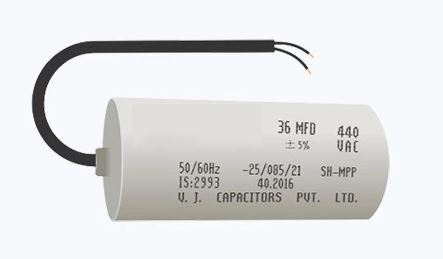Tel: 0129-4001010 Phone: +91 730 321 5033
Email: cs@absoluteveritas.com
BIS CERTIFICATION FOR AC MOTOR CAPACITORS IS 2993:1998
In today's competitive landscape, maintaining market presence without a certified, high-quality product can be challenging. Obtaining a BIS license may also be essential for selling products in the Indian market. To achieve BIS certification and ensure product quality, manufacturers must adhere to the specified Indian standards.
Let's delve deeper into at IS 2993:1998 for AC Motor Capacitors.
This specification pertains to motor capacitors designed for linking to the windings of single-phase asynchronous motors operating within a frequency range up to and including 100 Hz. Additionally, it includes capacitors intended for connecting to three-phase asynchronous motors, enabling these motors to be powered from a single-phase system.
This guideline is relevant to impregnated or unimpregnated capacitors featuring dielectrics made of paper, plastic film, or a combination thereof. These capacitors may have metallized or metal-foil electrodes and are rated for voltages up to and including 660 V. Meanwhile, the upcoming IEC 252, presently under review, will address electrolytic motor start capacitors.
The objective of this standard is:
-
To establish consistent regulations for performance, testing, and rating.
-
To develop specific safety rules
-
To provide installation and operation instructions
-
Type tests
-
Routine tests
The capacitor needs to satisfy the standard's criteria for quality, safety, and performance, ensuring compliance with specific application demands.
TESTS
The subsequent test must be conducted for Ac Motor Capacitors.
Type Tests:Type tests are aimed at validating the capacitor's design integrity and its ability to operate within the conditions outlined in this standard. If authorization is necessary, manufacturers and testing authorities carry out these tests. They may be overseen by a relevant authority, leading to the issuance of a certified documentation and type approval.
Routine Tests:Prior to shipping, the manufacturer is required to conduct routine tests on each capacitor.
The company must specify the types of capacitors they intend to include under the license. The scope of the license might be restricted based on the manufacturer's manufacturing and testing capabilities.
LABELLING AND MARKING
Labeling and marking should adhere to IS 2993:1998 / IEC 252:1993 guidelines. The capacitor must display the specified information outlined in the standard.
The Standard Mark (ISI Mark) will be affixed to the product if it complies with all specification requirements. To use the standard mark (ISI Mark), the manufacturer needs to acquire a BIS license from the Bureau of Indian Standards. This license is granted after a thorough assessment of manufacturing infrastructure, quality control, testing capabilities, and production processes.
PROCESS FOR BIS ISI MARK CERTIFICATION

BIS CERTIFICATION PROCESS
Acquiring a BIS license requires a comprehensive review of manufacturing infrastructure, quality control abilities, testing resources, and production procedures. This thorough assessment guarantees that products not only adhere to regulations but also prioritize consumer safety and reliability.
NOTE:
For comprehensive guidance on the BIS ISI Certification process, please explore:
WHY USE ABSOLUTE VERITAS?
Absolute Veritas is a prominent organisation from the private sector of India primarily dealing with the Inspection, Testing, Audits, Certification of products& consulting services to various industries in India and worldwide, ensuring compliance with regulatory standards and industry requirements. Offering a comprehensive range of services including product certification, testing, training, auditing, and compliance services, Absolute Veritas helps manufacturers and importers achieve higher production efficiency and quality standards.
Absolute Veritas (AV) will handle end to end pre-registration request, sample preparation, documentation, testing and application process for FMCS Certification
For any questions regarding the most recent update on FMCS registration licenses, please reach out to us via email at cs@absoluteveritas.com



